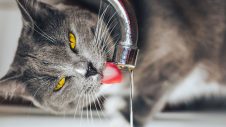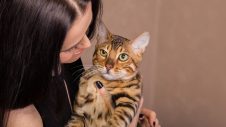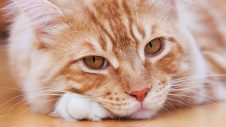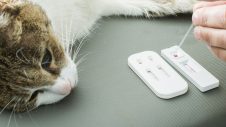What do my cat’s kidneys do?
The kidneys play a vital role in removing waste products from the bloodstream, retaining essential nutrients such as potassium, maintaining hydration, and producing urine.
What is chronic renal failure?
Chronic renal failure is a condition where, over time, the function of the kidneys deteriorates. This results in the body’s inability to remove waste matter and purify the blood. The signs that your cat is experiencing kidney problems will likely only become apparent when the disease has progressed. Being aware that this is a common disease will help you spot the symptoms earlier.
The signs
Cats usually show no signs of disease until 75% of their kidney function is gone. This means that when your cat shows obvious signs of the disease, it could already be in the advanced stages.
Excessive thirst and increased urination are the main signs that your cat’s kidneys aren’t functioning properly. However, diabetes mellitus, hyperthyroidism, and liver disease are a few other conditions that share these symptoms. It’s always best to let a vet give a proper diagnosis.
Other signs could include:
- Weight loss
- Poor coat quality
- Increased urination
- Inappropriate urination
- Incontinence
- Excessive drinking
- Vomiting.
Causes
Cats are particularly prone to kidney damage, which has various causes. Infections, cancers, exposure to toxins, and malfunction of the immune system may all be responsible for starting a slow process of damage that leads to kidney failure.
Kidney disease (or chronic renal failure) is the most common medical disease affecting cats. It is mostly seen in cats over the age of three.
How is renal failure diagnosed?
Renal failure is usually diagnosed via a blood test and urinalysis. These tests help determine the extent of the disease, allowing your vet to proceed with the best treatment.
Can renal failure be prevented?
The risks associated with chronic renal failure can be minimised by maintaining good hydration and a high-quality diet. While maintaining good hydration, it is important not to force your pet to drink excessively. Many good filtering and flowing water bowls are available that can help encourage good hydration. Once kidney disease is diagnosed, specific diets can help support the kidneys in maintaining good function. The key is early diagnosis, so make sure your pet has regular screening tests.
It is important to become familiar with what is and isn’t normal for your cat. If a significant increase in thirst and urine output is present, inform your local vet so that early intervention and monitoring can begin. Quality of life for cats with renal failure is very important; pet owners and veterinarians must monitor this.
Treatment options
- Diet – the kidneys filter waste products from the blood, and most of these waste products come from the food your cat eats. Therefore, the workload of the kidneys can be significantly reduced by the type of food you feed your cat. A diet low in phosphorous and protein and high in potassium and other essential nutrients can make a major difference in preventing or reducing the loss of more kidney cells. Special prescription diets are now available to make this easier. They come in tinned and dry food. It can take some cats a little while to get used to them. These foods should be fed exclusively, with no extras given.
- Antibiotics – it is relatively common for cats with renal failure to get urinary tract infections as their urine is less concentrated and more habitable to bacteria. For this reason, a urine culture and sensitivity may be recommended every six months.
- Angiotensin Converting Enzyme inhibitors – these help reduce protein loss in the urine and lower blood pressure. A urine test can determine if these drugs will be useful.
- If blood pressure is high, other medications can also be used to help reduce it.
- Fluid therapy – the patient should be encouraged to take in as much water as possible through wet food, flavoured water, and water fountains. If this is not sufficient, intravenous fluids can be used.
Prognosis
Kidney cells that have been damaged cannot be repaired. However, progression can be slowed down with appropriate treatment. This can improve the cat’s well-being and significantly extend their lifespan. Each case should be assessed individually by your veterinarian, with management based on the results of ongoing blood and urine testing.
Contact your local Greencross Vets if you’re concerned about symptoms in your pet.

 Greencross Vets
Greencross Vets 










